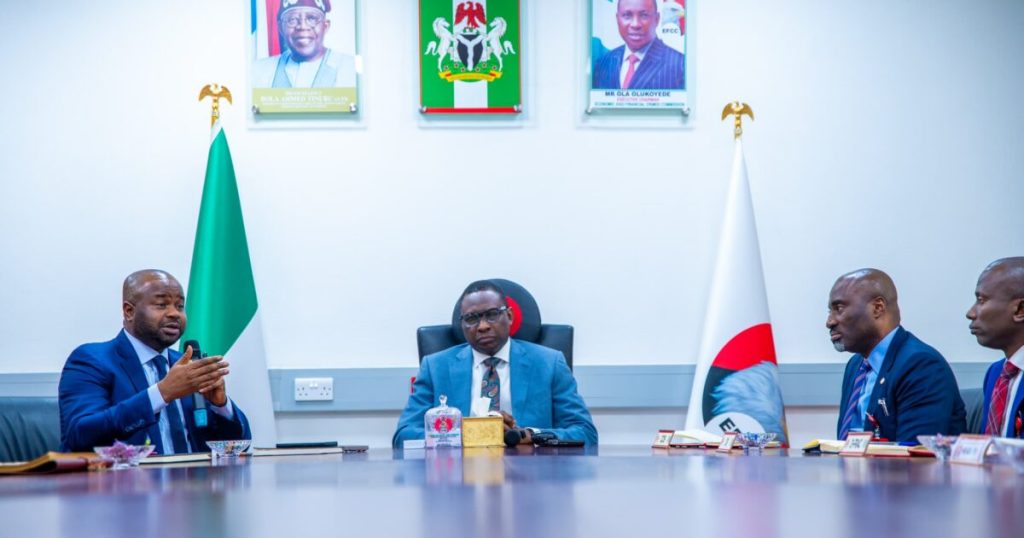The Federal Inland Revenue Service (FIRS) has underscored the crucial role of the Economic and Financial Crimes Commission (EFCC) in bolstering voluntary tax compliance in Nigeria. During a recent visit to the EFCC headquarters in Abuja, FIRS Executive Chairman, Dr. Zacch Adedeji, emphasized the necessity of inter-agency collaboration to enhance the nation’s tax compliance framework, protect public revenue, maintain financial stability, and foster public trust in the revenue system. This partnership comes as the FIRS prepares for a significant transformation into the Nigerian Revenue Service under the newly enacted Tax Acts, set to take effect in January 2026. The visit served as a platform for both agencies to reaffirm their commitment to a strengthened collaborative approach in tackling tax evasion and promoting a culture of responsible tax payment.
Adedeji highlighted the strategic importance of showcasing the tangible benefits of tax revenue to encourage voluntary compliance. He stressed that demonstrating how collected taxes are utilized for public good serves as the most effective motivator for citizens to fulfill their tax obligations. The FIRS chairman believes that visible improvements funded by tax revenue will significantly enhance public perception and encourage willing participation in the tax system. He further emphasized the EFCC’s critical role not only in apprehending tax defaulters but also in supporting the FIRS’s Department of Fraud Risk, Assessment, and Control to ensure the judicious use of public funds, thereby reinforcing public trust and encouraging compliance.
The collaborative approach between FIRS and EFCC is not solely focused on punitive measures. Adedeji acknowledged the limitations of pursuing individual taxpayers and advocated for establishing a robust system that facilitates compliance. He expressed gratitude for the EFCC’s support in enforcing tax laws, emphasizing their role in deterring potential offenders by demonstrating the consequences of non-compliance. The partnership aims to create an environment where individuals understand the legal ramifications of tax evasion, promoting a proactive approach to fulfilling tax obligations. This strategy underscores the belief that a combination of efficient systems and demonstrable consequences will be more effective than pursuing individual taxpayers.
Adedeji attributed Nigeria’s recent success in meeting its revenue target to proactive strategies and strong partnerships with agencies like the EFCC. He characterized the achievement as a collective effort, highlighting the importance of inter-agency cooperation in achieving national revenue goals. This success comes in the wake of President Bola Tinubu’s announcement that the Federal Government had met its revenue target for the year by August, with a substantial portion of the collected revenue originating from non-oil sources. This achievement underlines the effectiveness of the collaborative approach adopted by revenue-generating agencies and the government’s focus on diversifying revenue streams.
Responding to Adedeji’s remarks, EFCC Chairman, Mr. Ola Olukoyede, reiterated the EFCC’s commitment to continued collaboration with the FIRS. He emphasized that the visible partnership between the two agencies sends a strong message to the public about the government’s resolve to combat tax evasion and promote accountability. Olukoyede pointed to a recent Court of Appeal judgment affirming the EFCC’s jurisdiction to investigate tax fraud as a significant boost to their mandate. While acknowledging that the EFCC’s primary role is not assessing tax liabilities, he highlighted their authority to investigate non-compliance and refer assessment issues back to the FIRS.
The meeting concluded with both leaders pledging to further solidify their working relationship, emphasizing preventive measures and voluntary compliance as cornerstones of Nigeria’s tax system. The reinforced partnership between the FIRS and EFCC signifies a concerted effort to enhance tax compliance, safeguarding public revenue and promoting financial stability. The focus on fostering a culture of voluntary compliance through transparent use of tax revenue and demonstrable consequences for non-compliance underscores a strategic shift towards a more proactive and collaborative approach to tax administration in Nigeria. This strengthened collaboration aims to build a more robust and sustainable tax system, contributing significantly to the nation’s economic growth and development.


